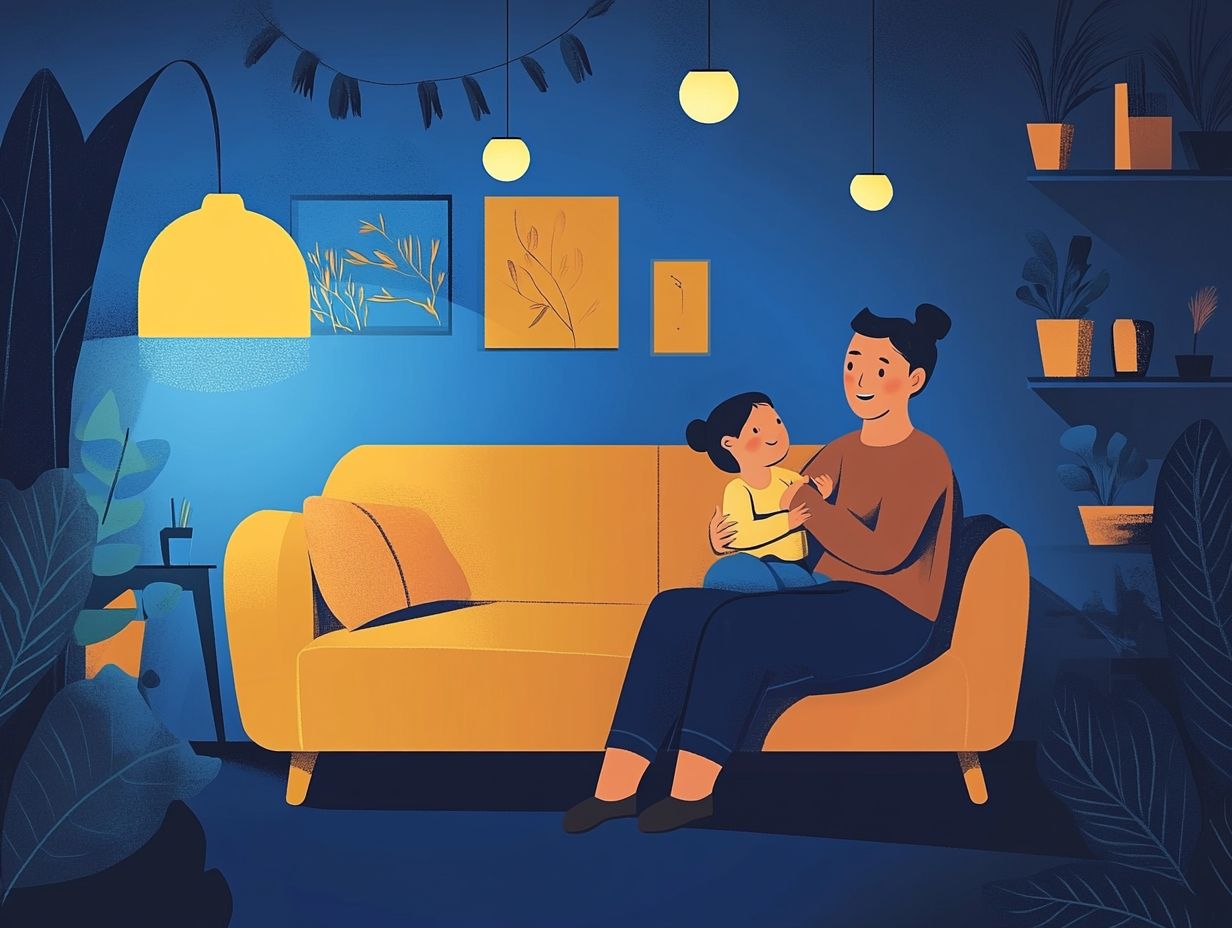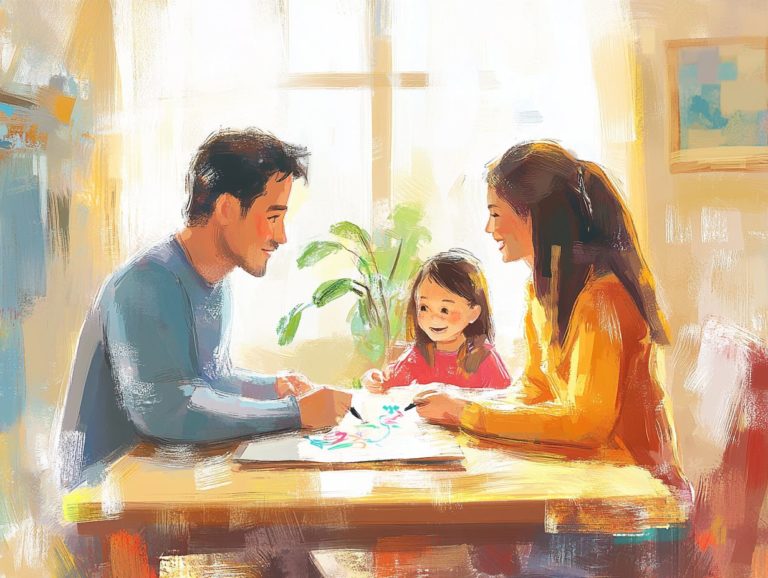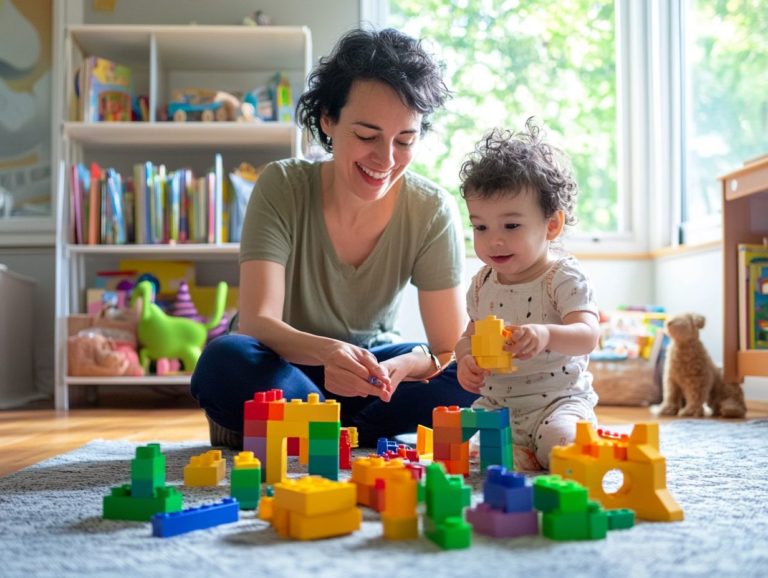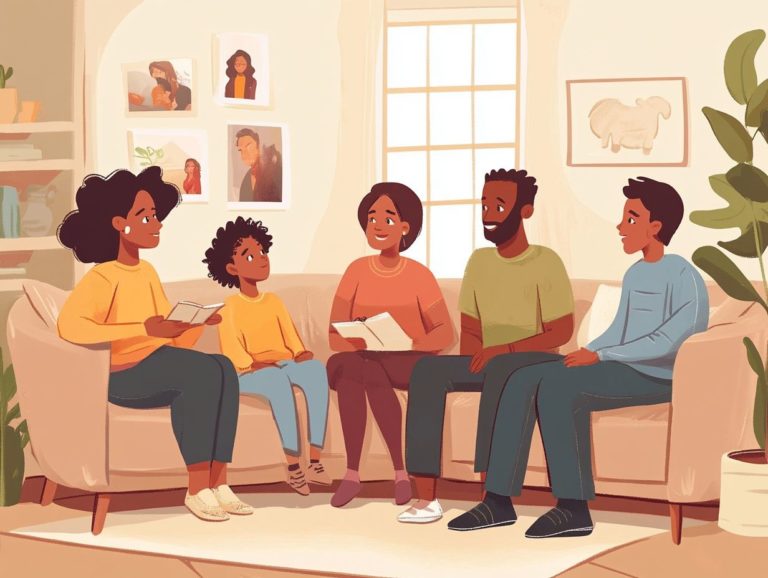Using Reflection to Improve Parent-Child Talks
In today s fast-paced world, effective communication between parents and children is more essential than ever, especially when navigating parenting challenges like bedtime battles.
Reflection an active listening technique that promotes thoughtful dialogue has the power to transform these conversations. It nurtures a deeper understanding and connection between you and your child, fostering a strong parent-child relationship.
This article delves into the concept of reflection, illustrating how you can apply it in your interactions with your children and highlighting the many benefits it offers.
From practical techniques to navigating common challenges, explore how mastering this skill can significantly strengthen your relationship and enhance communication within your family.
Contents
- Key Takeaways:
- What Is Reflection?
- How Can Reflection Be Used in Parent-Child Talks?
- How to Use Reflection Effectively in Parent-Child Talks?
- What Are Some Potential Challenges of Using Reflection in Parent-Child Talks?
- How Can Reflection Help Strengthen the Parent-Child Relationship?
- What Are Some Other Strategies for Improving Parent-Child Talks?
- Frequently Asked Questions
- 1. What is the concept of using reflection to improve parent-child talks?
- 2. Why is using reflection important for improving parent-child talks?
- 3. How can parents incorporate reflection into their conversations with their children?
- 4. Can reflection be used to address conflict in parent-child talks?
- 5. What are some benefits of using reflection in parent-child talks?
- 6. Are there any tips for using reflection effectively in parent-child talks?
Key Takeaways:

- Reflection allows for deeper understanding and connection in parent-child talks.
- Effective reflection can improve communication and build a stronger parent-child relationship.
- Combining reflection with other strategies can enhance parent-child discussions.
What Is Reflection?
Reflection in the context of parenting is an invaluable process that encourages you to engage in self-reflection and assess your parenting strategies, emotional responses, and overall parenting style.
By committing to this practice, you cultivate emotional awareness and understanding of feelings, gaining a deeper insight into your children’s emotions and needs.
As you navigate the complexities of parenthood, embracing reflective practice can significantly enhance your emotional intelligence. This leads to more positive and effective communication.
Ultimately, this approach fosters secure attachments and mitigates the impact of trauma and neglect. This ensures a healthier environment for your children and contributes to their mental health.
How Can Reflection Be Used in Parent-Child Talks?
Reflection serves as an invaluable tool in your conversations with your child. It allows you to gain deeper insights into their emotions while fostering robust communication.
By employing techniques like reflective listening which means repeating back what your child says you establish a safe haven for open dialogue. This is crucial for building healthy relationships.
This approach helps resolve conflicts and improves your parenting style. When children feel validated and heard during discussions, they are more likely to develop secure attachments and effectively manage their feelings.
What Are the Benefits of Using Reflection in Parent-Child Talks?
Embrace reflective parenting techniques to revolutionize your parenting journey!
Using reflection in your conversations with your child can bring about a multitude of benefits, such as heightened emotional awareness, enhanced communication skills, and the cultivation of healthy relationships.
By weaving reflective practices into your discussions, you position yourself to better guide both your own understanding of feelings and that of your child. This contributes to a more harmonious family dynamic.
Parenting programs that focus on these reflective techniques frequently report an uptick in positive outcomes. Parents grow more adept at navigating emotionally charged conversations with greater ease and understanding.
Research supports the notion that these reflective practices do more than just help in verbalizing feelings; they also empower children to develop empathy and resilience. For instance, studies indicate that when parents exemplify reflective listening, children are more inclined to express their emotions and appreciate diverse viewpoints.
Engaging in these thoughtful dialogues can significantly reduce behavioral issues. Families become more skilled at addressing underlying emotional triggers. This ongoing engagement creates a safe space where both you and your child feel validated.
Ultimately, this strengthens emotional bonds and fosters a deeper sense of trust within your family.
In conclusion, using reflection as a tool in your parenting journey can profoundly impact your connection with your child. Start using these techniques today to enhance communication and nurture your relationship!
How Can Reflection Improve Communication in Parent-Child Talks?
Reflection enhances communication in your conversations with your child by fostering a deeper understanding of emotions and elevating emotional intelligence, both of which are essential for productive dialogue.
By embracing mindful parenting techniques, you can harness reflective function to better interpret your child’s feelings and reactions, paving the way for more effective communication. This approach not only fortifies the bond between you and your child but also equips you with vital skills for conflict resolution, empowering you to tackle challenges with empathy and constructiveness.
By actively engaging in reflective practices, you model the importance of listening and validating feelings, creating a safe space for your child to express themselves. Techniques such as summarizing your child s thoughts or asking open-ended questions encourage them to articulate their feelings with greater ease. Using “I” statements can help express your own emotions without sounding accusatory, paving the way for more fruitful conversations.
Ultimately, these strategies enhance understanding and build trust, allowing your child to feel heard and valued, significantly elevating the overall communication dynamic.
What Are Some Examples of Reflection Techniques?

You have a wealth of effective reflection techniques at your disposal for engaging in meaningful conversations with your children. Techniques like reflective listening, self-reflection questions, and role-playing scenarios can transform your interactions.
Reflective listening means actively engaging with what your child says to build trust. By posing self-reflection questions, you can evaluate your reactions and thoughts, enhancing your emotional sensitivity and providing deeper insights into your parenting style. Many parenting programs weave these techniques into their curriculum, empowering you with the skills needed to cultivate healthier relationships.
Consider a scenario where your child expresses frustration about a school project. You can practice reflective listening by paraphrasing their feelings and clarifying their concerns, effectively making them feel heard and validated. During self-reflection, you might ask yourself questions like, “How did I respond to my child’s frustration?” or “What feelings does this situation trigger in me?” These inquiries can help you gain a clearer understanding of your own emotional responses.
Role-playing can also be a game-changer, especially when prepping for tough conversations or teaching skills to solve disagreements. It allows both you and your child to explore various outcomes in a safe environment. Incorporating these techniques can create a nurturing space that transforms your conversations!
How to Use Reflection Effectively in Parent-Child Talks?
To effectively employ reflection in conversations with your child, adopting a mindful parenting approach is essential one that prioritizes emotional regulation and self-care. This means being fully present during your discussions, actively engaging with your child’s emotions, and practicing reflection to evaluate your own feelings and reactions.
By honing these skills, you can elevate your communication dynamics, foster open dialogue, and respond to your child’s needs with empathy and understanding. This creates a more supportive and nurturing environment that benefits both you and your child.
What Are Some Tips for Practicing Reflection in Parent-Child Talks?
Enhancing reflection in parent-child conversations can be achieved through several actionable strategies that invite a deeper connection. Consider incorporating self-reflection questions and nurturing understanding feelings during these discussions. Regularly assessing your communication skills and remaining open to feedback from your children can provide invaluable insights into your parenting approach.
In co-parenting situations, engaging in thoughtful discussions together is essential to foster a unified strategy that prioritizes your children’s emotional well-being. This ultimately reinforces a strong family dynamic. Programs like those offered by the Center for Reflective Parenting in Los Angeles can be particularly helpful.
To cultivate an effective environment for reflection, set aside dedicated time for discussions where everyone feels safe to express their thoughts. Simple self-reflection questions like “How did that make you feel?” or “What do you think could be done differently?” can spark meaningful dialogue.
Remember, validating your children’s feelings by showing empathy and understanding encourages emotional sensitivity and strengthens your bond. In co-parenting relationships, conducting regular check-ins about what techniques are working can promote consistency, ensuring that both parties are aligned and fostering a supportive atmosphere for your children.
What Are Some Common Mistakes to Avoid When Using Reflection in Parent-Child Talks?
When engaging in reflective conversations with your child, be aware of common pitfalls. One significant mistake is failing to practice emotional regulation and underestimating the importance of your communication relationship. Make sure you stay open and understanding to keep the conversation flowing, as becoming defensive or dismissive can undermine the effectiveness of your discussions.
Steering clear of rigid parenting styles that stifle open communication is vital; instead, embracing an authoritative parenting approach encourages vulnerability and authenticity. For example, many parents struggle with active listening, which can lead to misunderstandings and escalating conflicts.
A helpful strategy is to employ active listening techniques, such as summarizing what your child has said before responding. This not only shows respect for your child’s feelings but also fosters a deeper understanding between you both and enhances communication relationships.
Be mindful not to project your own emotions onto your child; instead, allow them the space to express their feelings authentically. Your patience and calmness can create a safe space for your child to share openly, ultimately strengthening your relationship and building trust.
Start implementing these conversations today to deepen your bond with your child!
What Are Some Potential Challenges of Using Reflection in Parent-Child Talks?
Reflection is essential for enriching your conversations with your child. However, several challenges may emerge along the way. You might encounter difficulties related to managing emotions, as well as the lingering effects of past trauma or neglect that can influence your communication dynamics.
Your child may resist these discussions if they feel overwhelmed or misunderstood, which can complicate your relationship and impede effective communication. If you re grappling with high levels of stress or unresolved emotional issues, fully engaging in reflective practice may prove to be quite a challenge.
How Can Parents Overcome These Challenges?

To effectively navigate these challenges, prioritize managing your emotions. Consider seeking support through parenting programs or mental health resources like the Center for Reflective Parenting in Los Angeles. By engaging in reflective practice and mastering effective communication strategies, you can better manage emotionally charged discussions while ensuring that your own mental health needs are addressed.
This dual focus strengthens your relationship with your child and equips you with essential tools for cultivating a nurturing and supportive environment. Experts like John Grienenberger and Diane Reynolds emphasize the importance of such environments in fostering healthy emotional development.
Make time for open dialogue to enrich your conversations! Here, both you and your child can express your feelings without fear of interruption or judgment. Actively listening and validating your child’s emotions can greatly enhance the quality of these conversations.
It s also beneficial for you to model healthy coping mechanisms to show your child how to manage stress and frustration effectively. Joining community support groups can offer valuable insights and shared experiences, helping to normalize the ups and downs of parenting and improve communication relationships.
By adopting these strategies, you create a safe space for your child to express themselves while reinforcing your own resilience and emotional well-being.
How Can Reflection Help Strengthen the Parent-Child Relationship?
Reflection is an essential tool for enriching the parent-child relationship, elevating emotional intelligence, and improving the quality of communication. Engaging in reflective practices deepens your understanding of your child’s needs, feelings, and perspectives.
This cultivation promotes a secure attachment and builds a foundation of trust. Such awareness plays a crucial role in resolving conflicts, allowing you to respond to your child’s emotions with greater empathy.
Ultimately, this leads to a more connected and harmonious family dynamic.
What Are Some Other Strategies for Improving Parent-Child Talks?
Besides taking time for reflection, you can explore several other effective strategies to enhance your conversations with your child. Consider honing your communication skills, engaging in parenting programs, and practicing emotional sensitivity.
Learning about reflective listening techniques can significantly improve your interactions, fostering a sense of understanding and validation in your discussions. Implementing co-parenting strategies that emphasize consistent communication and shared parenting goals is also vital.
This approach cultivates a supportive environment for your child and encourages open and meaningful dialogues between you and your child.
What Are the Benefits of Using a Combination of Strategies?
Employing a blend of strategies, such as reflection and mindful parenting, can yield a wealth of benefits that significantly enhance the effectiveness of your conversations with your child. By integrating various methods, you have the opportunity to improve emotional regulation and cultivate stronger communication bonds with your little one.
This approach not only facilitates effective conflict resolution but also promotes positive parenting practices, ultimately leading to healthier family dynamics and deeper emotional connections.
For instance, when you engage in reflective listening during a conversation, you encourage your child to express their thoughts and feelings openly. Pairing this with mindful responses where you fully acknowledge your child’s emotions and reflect on them creates a safe space for open dialogue.
Take, for example, a situation where your child is feeling frustrated over a challenging homework assignment. Instead of jumping straight to solutions, you can first validate their feelings and then collaboratively explore problem-solving together.
These strategies empower your child and build trust, creating a nurturing environment that fosters emotional growth and mutual understanding.
Frequently Asked Questions
Here are some common questions about using reflection in parenting:
1. What is the concept of using reflection to improve parent-child talks?

Using reflection in parent-child talks involves taking the time to think about and discuss the communication and interactions between parents and children to strengthen their relationship.
2. Why is using reflection important for improving parent-child talks?
Using reflection allows both parents and children to gain a deeper understanding of their own thoughts, feelings, and behaviors, as well as those of the other person. This leads to clearer communication and a stronger bond between parent and child.
3. How can parents incorporate reflection into their conversations with their children?
Parents can incorporate reflection by actively listening to their child’s thoughts and feelings, asking open-ended questions to encourage deeper thinking and discussion, and reflecting on their own responses and behaviors during the conversation.
4. Can reflection be used to address conflict in parent-child talks?
Yes, reflection can be a helpful tool for addressing conflict. By reflecting on the thoughts and feelings behind the conflict, both parent and child can gain a better understanding of each other’s perspectives and work towards finding a resolution.
5. What are some benefits of using reflection in parent-child talks?
Some benefits of using reflection include improved communication and understanding between parent and child, increased self-awareness and self-reflection for both parties, and a stronger and more positive relationship overall.
6. Are there any tips for using reflection effectively in parent-child talks?
Some tips for using reflection effectively include being patient and giving each other time to think and respond, avoiding judgment or criticism, and using reflective language such as “I” statements and open-ended questions.






